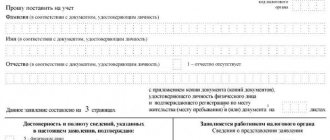Main
Some people think that purchasing from an individual by a legal entity is prohibited, but this is not so. Why? After all, it will not be possible to issue a check or invoice!
It can be done differently. For this type of transaction it is not necessary to draw up an agreement. The parties themselves decide on this issue, but we still recommend documenting the operation. First of all, such a measure will avoid many problems and provide a guarantee that the transaction will be completed.
As for payment, a purchase from an individual by a legal entity can be paid either in cash or by transfer to a personal account in a banking organization. It is important to understand that the settlement amount is not limited by anything, since the law allows payments to individuals in any amount.
✅ Taxes
Expert opinion
Semyon Frolov
Lawyer. 7 years of experience. Specialization: family, inheritance, housing law.
The purchase of an apartment is not grounds for payment of VAT by the legal entity. persons, since such an operation does not provide for tax profit (Article 149 of the Tax Code of the Russian Federation). At the same time, the taxpayer can independently waive the right to be exempt from VAT (clause 5 of Article 149 of the Tax Code of the Russian Federation). To do this, at the territorial branch of the Federal Tax Service, an authorized representative of the company writes a corresponding application, but no later than the 1st day of the period from which it became necessary to refuse the exemption of VAT payments. This means that the acquisition of living space by an enterprise will be taxed only if members of the company wish to pay VAT.
If property is purchased for resale, the company must pay income tax. Under the general taxation system (OSNO), income tax and VAT are charged on revenue. The amount is based on the difference between the purchase and sale prices of the property. Under the simplified tax system, the taxable base is considered to be revenue (taxed at a rate of 6%) or the difference between income and expenses (at a rate of 15% or in the amount established in the region of the transaction).
Living space is taxed if it is not on the company’s balance sheet as property classified as fixed assets (Article 378.2 of the Tax Code of the Russian Federation). This is most often encountered by legal entities. persons engaged in transactions with residential real estate. Property is treated like a product, not a fixed asset, and is subject to taxation, which applies to the sale of products.
An additional expense item is the payment of enterprise property tax. This is a regional fee that is charged to all legal entities. persons registered in the country (Article 374 of the Tax Code of the Russian Federation). The amount of tax collection is no more than 2% of the cadastral value of the premises on the balance sheet of the enterprise.
Property tax applies to the purchase of real estate by enterprises using the general tax regime. The final rate is set at the municipal level.
It is advisable to convert the purchased residential space into commercial space, especially if the company owns other similar properties. Because It is possible to take advantage of a benefit or exemption from real estate tax only for one object of a certain type. In addition, an apartment removed from the housing stock can be rented out at a minimum price. This way, the amount of tax payments will decrease several times.
The transfer of property from residential to non-residential is carried out within the framework of the current legislation (clause 3 of Article 288 of the Civil Code of the Russian Federation). Living space is considered the main asset if it was purchased for the needs of the enterprise.
The purchase of an apartment by a legal entity is not very different from a similar transaction that is carried out between individuals. persons. But, as with any property transaction, it has its own nuances, advantages and disadvantages. Therefore, it is advisable to carry out such transactions with legal support. You can also ask our lawyers your questions. What are the features of buying and selling an apartment in your particular case? How to properly register property so as not to violate tax laws and avoid paying extra taxes? Is it worth removing the apartment from the housing stock? You will receive complete answers to these and other questions.
for free.
Attention!
- Due to frequent changes in legislation, information sometimes becomes outdated faster than we can update it on the website.
- All cases are very individual and depend on many factors. Basic information does not guarantee a solution to your specific problems.
That's why FREE expert consultants work for you around the clock!
- via the form (below), or via online chat
- Call the hotline:
- 8(800)302-39-65
— All residents of the Russian Federation - +7(495)128-69-80
— Moscow and the Region - +7(812)509-13-65
— St. Petersburg and region
- FREE for a lawyer!
By submitting data you agree to the Consent to PD Processing, PD Processing Policy and User Agreement.
Anonymously
Information about you will not be disclosed
Fast
Fill out the form and a lawyer will contact you within 5 minutes
Tell your friends
Rate ( 1 ratings, average: 5.00 out of 5)
Author of the article
Maxim Privalov
Lawyer. 2 years of experience. I specialize in civil disputes in the field of housing and family law.
Author's rating
Articles written
614
What the law allows
Below we will provide documents for the purchase from an individual by a legal entity, but for now let’s talk about which transactions can be carried out with individuals and which cannot.
There is a law “On the contract system in the field of procurement”, according to which, in addition to enterprises, individual entrepreneurs and organizations, an individual can act as a bidder.
Procurement in such a situation can be carried out under Article 93 of Federal Law-44 or in a competitive way, that is, through an auction or competitions. A prime example is citizens who are hired as tour guides or teachers for a short period of time.
The only restriction is that individuals are not eligible to participate in bidding aimed at SONPOs and SMPs. How can I find out about such participants? This point must be specified by the customer in the procurement documents.
Another indicator is the difference between applications. We are speaking:
- About the surname, patronymic and first name, as well as the place of residence of the supplier. Usually the name of the enterprise and its legal address are written in this place.
- About documents that prove identity. As a rule, an extract from the Unified State Register of Legal Entities should be located here.
- Only participating enterprises must indicate the IIN. Individuals are exempt from this.
It is important to understand that when a legal entity makes a purchase from an individual, the cost of the goods is reduced by personal income tax. It is not only possible, but also necessary to pay attention to all these points so that problems do not arise in the future.
How to buy from the city: transaction features
The seller is not always an individual or legal entity; sometimes the city acts as the owner. In this case, the real estate is put up for auction, in which anyone can take part (individual entrepreneurs, legal entities, citizens of the Russian Federation and non-residents). There is a program “1 ruble per sq.m.” (per year), according to which non-residential premises are leased for long-term, subject to the placement of socially significant objects for the city (educational, healthcare, cultural institutions).
What the city has to offer:
- non-residential premises for sale and rent;
- rights to place/carry out trade in non-stationary retail facilities;
- land plots for construction for rent;
- projects for the construction of transport hubs or landscaping for sale.
Most trading is carried out in the form of electronic auctions , where the winner is determined by one criterion - the offered price. For road construction and improvement projects, the winner is identified based on several criteria: price, experience in implementing similar projects, proposed implementation time frame.
Rented properties can subsequently be sold to tenants, but at the moment this opportunity is only available to those who entered into an agreement before July 1, 2013. Information about auctions is distributed on city investment websites, as well as on the website torg.gov.ru. To participate, you must submit an application, submit the necessary documents and make a deposit (depending on the type of object, it can be up to 50% of the initial price of the lot).
If another participant wins the auction, the deposits of the others are returned back. So, for example, the starting price of a basement with an area of 15.2 sq.m. in Moscow is 1.095 million rubles, and the deposit is 219,000 rubles.
Step-by-step instructions for purchasing from the city
After selecting a suitable object, the bidding procedure begins:
- Filing an application.
The document is filled out electronically according to the form attached to the auction. - Depositing funds for a deposit.
- Presentation of documents.
The list is different for individuals and legal entities; the common thing is a payment document confirming the transfer of the deposit.- Individuals provide copies of identification documents (all pages of the passport, for minors - passport or birth certificate and passports of parents/guardians and their written consent).
For individual entrepreneurs – an extract from the Unified State Register of Individual Entrepreneurs or a notarized copy thereof, received no earlier than 6 months before filing the application.
- For legal entities - an extract from the Unified State Register of Legal Entities (or a copy notarized within the last six months), a power of attorney from a legal entity or documents granting the right to represent its interests, identification documents of the representative, copies of constituent documents, a decision to approve the transaction.
- Inspection of the premises.
- Receive notification of the place and time of the auction.
Information is posted on the city's official website and in local newspapers at least a month before the start of the auction. - Conducting an auction.
The competition commission selects the buyer based on the best price or other parameters. If you win, a purchase and sale agreement is concluded, and the deposit is counted towards the total amount of the purchase funds. In case of loss, the deposit is returned minus the auction commission. - Registration of the contract.
The commission and the buyer sign the auction protocol, after which each party receives a copy. The seller enters into a contract for the sale of real estate with the winner, drawn up by the selling party. The agreement does not require registration, except for the cases specified in Art. 131 and 164 of the Civil Code of the Russian Federation mentioned above. The state duty is also paid in accordance with the norms: 2,000 rubles for individual buyers or 22,000 rubles for legal entities. - Publication of trading results.
Information is posted on the website and in newspapers within 3 days from the date of signing the contract.
In general, the purchase of commercial real estate from the city differs only in the bidding procedure.
Basic documents
A purchase from an individual by a legal entity is accompanied by a package of papers, without which the transaction simply will not be carried out. What are these documents? Let's see.
- The act of acceptance and transfer of property.
- Act SP-40. Used if animals are purchased.
- Procurement act in form OP-5.
- Acceptance certificate. Needed if you buy scrap metal.
It is important to remember that there should always be two acts.
By the way, you can draw up a deed yourself using an individual sample. In such a situation, you need to make sure that the form contains all the necessary details. Let's talk about them.
Required details
The purchase of goods from an individual by a legal entity must be formalized using acts. These documents must include standard details. What are we talking about?
- Title of the paper.
- Date the document was signed.
- Contents of the document.
- Name of the business or organization.
- Quantity and unit of measurement.
- Signatures of both parties.
Based on this paper, the company will accept the cost of the goods as an expense, which is necessary if the taxation system involves paying the difference between expenses and income.
Documents for payment
The purchase of goods from an individual by a legal entity is also carried out for money. And there are two payment methods: cash and bank transfer. The latter option must be confirmed using a payment order.
But cash payments are worth considering in more detail. For an enterprise or organization, there are two ways of settlement with an individual:
- Issuing money from the cash register. In this case, a cash receipt order is issued, but not always. For example, individual entrepreneurs do not have to do this.
- Issuing cash to an employee of an enterprise on account. Once the employee pays the seller, he will be required to prepare an advance report. But the latter is not served without everything; a document is attached to it, which contains a note about payment for the goods.
When is a procurement act issued?
If it is planned to purchase equipment from an individual by a legal entity or we are talking about some kind of value, then it is necessary to draw up a procurement act. The latter can act as a primary contract, or it can become an independent document. This is due to the form of the contract, which can be different.
The document will come into force only after signature of both parties.
There is an already developed template in the OP-5 form that you can use. Alternatively, a company can develop a template on its own.
Apartment purchase
How does a legal entity purchase real estate from an individual? The procedure is not so different from the standard one for purchasing real estate.
First of all, you need to remember that a legal entity can buy an apartment or premises either from the same legal entity or from a private person. The law allows both options.
The legal entity will be a commercial organization with the status of JSC, LLC, CJSC. The purchase of an apartment from an individual by a legal entity can be carried out for the following purposes:
- Investment. People buy an apartment to invest money and resell it in the future. In this case, the apartment is not the main asset.
- Commercial. The apartment is the main asset and accounting is maintained for it.
The difference from a standard transaction is that it is necessary to obtain consent from the owner of the enterprise for a major acquisition. By the way, a major transaction is one that exceeds a quarter of the value of the organization’s assets.
Results
For an organization, there are no fundamental differences in accounting for transactions involving the purchase of fixed assets from legal entities and individuals.
The accountant draws up the same primary documents and makes the usual postings. And most importantly, there is no obligation to pay additional taxes and prepare reports. You can find more complete information on the topic in ConsultantPlus. Free trial access to the system for 2 days.
How the transaction is carried out
The purchase of premises by a legal entity from an individual follows the standard procedure.
- The participants discuss important aspects of the transaction.
- A preliminary purchase and sale agreement is signed and an advance or deposit is made.
- The participants sign the main agreement.
- The buyer and seller go through the procedure of state registration of the transfer of ownership rights.
- The final payment is due under the sales contract.
- Participants sign an act of acceptance and transfer of real estate.
The seller is required to have a certain package of documents, which must already be ready at the time of sale.
This:
- Passport.
- A certificate of title or other document that establishes ownership.
- An extract from the register confirming the absence of encumbrances.
- Documents that explain how the owner came to own title. This includes a privatization agreement, a purchase and sale agreement or a will.
- Explication of the premises and technical plan from the BTI. These papers confirm the absence of undocumented redevelopments.
- An extract from the house register, which shows that there are no registered persons in the apartment.
- Extract from the Unified Housing Document or financial and personal account. With its help, the seller confirms that there are no debts on utility bills.
- If necessary, consent from the guardianship authorities to the transaction. This will be necessary if the owners include persons under guardianship or minors.
Sometimes the seller attaches a power of attorney for the provision of interests to the existing package. This happens in situations where the transaction is carried out by an authorized representative.
Features of the transaction and legislative acts governing it
The main feature of a transaction with legal entities is that it requires a thorough check of its purity and the need to examine a thick package of documents. But this does not mean that apartments should not be purchased from enterprises and organizations.
Here are examples when a transaction for the purchase and sale of an apartment is possible only with a legal entity:
- purchasing a new apartment from a developer;
- buying an apartment from a real estate agency;
- The bank buys the apartment.
We talked about the advantages and disadvantages of buying housing on the secondary market and in a new building here, and from this material you will learn about the nuances of conducting a transaction through a real estate agency.
Basic legislative acts that will help determine the legality of a transaction:
- Civil Code of the Russian Federation, part one, chapter 4; part two, chapter 30, paragraphs 1.
- Federal Law No. 122 “On state registration of rights to real estate and transactions with it” dated July 21, 1997.
Some nuances
When purchasing property by an individual from a legal entity and vice versa, it is necessary to devote a lot of time to the purchase and sale agreement. When drawing up, the requirements of the Civil Code of our country must be taken into account. The contract must clearly define the property, describe the parties to the sale and purchase, and contain the cost of the transaction. The last requirement is very important, because if there is no information about the price, the contract will be declared invalid.
In addition, the document must reflect all persons registered in the apartment, the obligations and rights of the parties, the presence of housing and communal services debts and encumbrances, and the conditions for terminating the contract.
In addition, during the preparation of documents, the seller will have to write an application for alienation, and the buyer for taking ownership. You should not ignore the state duty, as this is a necessary contribution. For legal entities it is equal to 22 thousand rubles. The amount is relevant for each region and is enshrined in the Tax Code.
Buying and selling an apartment between an individual and a company
When a decision is made to purchase an apartment from a legal entity, it is necessary to check the seller’s compliance with the laws, since there are violations in the latter’s actions . This happens for the following reasons:
- ignorance of laws;
- negligence in design;
- fraudulent activities.
It is better to do this with the involvement of a lawyer. If no violations are established, then the further procedure proceeds as usual until the rights to the apartment are transferred to the buyer.
The purchase and sale procedure is similar, when the buyer is an enterprise/organization and the seller is an individual (we talk about the standard procedure for conducting a home purchase and sale transaction here). Now the buyer-enterprise must check the legality of the actions of the seller-citizen. After this, the algorithm of actions takes the usual order.
Buyer and Seller Risks
The risks of the participants, if a transaction is made between an individual and a legal entity, are similar to any other transaction for the purchase and sale of real estate, but they are higher. Common risks include the following :
- Large sums are involved, which increases potential losses.
- The risk of fraud and forgery of documents increases (sale without agreement with the founders, sale by a person who does not have a general power of attorney, etc.).
- A legal entity is more likely to terminate a transaction, for example, due to the lack of consent of all founders.
- A transaction is considered void if the organization has been liquidated or declared bankrupt, and the entity that certified the agreement did not have the competence to carry it out, or such opportunities have been suspended, or their validity period has expired.
How to avoid risks?
Citizen
To avoid risks, the individual buyer conducts a thorough check of the documents submitted by the seller-company. It is carried out as follows.
Based on Art. 62, 63 of the Law of the Russian Federation on the registration of real estate through the MFC, an extract on registered rights, transfer of rights, and the presence of encumbrances is requested. From it you will see:
- who is the owner of the apartment;
- who was the previous owner and how it was transferred to the seller;
- whether it is mortgaged;
- Are there any other restrictions?
Such an extract is issued to any interested person. Only his personal data is decrypted and the state duty is paid.
Whether the transaction is large can be determined from the latest financial statements. A copy of the report, with a tax mark, will be provided by the seller. Whether consent for the sale has been received will be determined from the participants. Information about participants is obtained from the tax office through a request. There they also receive information about the person who has the right to act without a power of attorney - whether he is authorized.
The Management Company will issue a certificate confirming the absence of unauthorized persons registered in the apartment , and they will also obtain a certificate confirming the absence of debt on utility bills.
To the enterprise
When an enterprise purchases an apartment from an individual, it is necessary to check the standard package of documents. Particular attention should be paid to the following points:
- whether the notarized consent of the spouse has been obtained;
- whether, in the presence of minor children, permission from the guardianship and trusteeship authorities has been obtained.
The seller provides this information in writing. The submitted official documents from the notary and from the guardianship and trusteeship authorities are usually sufficient. If in doubt, you can request confirmation of their issuance.
Deal nuances
A transaction between a legal entity and an individual takes place in the same algorithm and is no different from a transaction between legal entities and from sales and purchases between individuals.
You should pay attention to an important stage in the transfer of funds. Transfer funds for real estate to the head of the organization or a trusted representative. They need to be given only to the organization’s cash desk or transferred by transfer to its account.
Preparation of a package of documents
When selling and buying an apartment, a legal entity, regardless of who it sells to or from whom it buys, prepares the same package of documents discussed above. An individual prepares his/her package of documents also regardless of the seller or buyer.
From our separate publications you can learn about how to find out the real cost of housing, what an alternative transaction is and whether registration of a DCT is always required.
Features of the PrEP conclusion
The conclusion of an agreement between an enterprise and a citizen differs from the agreements that one enterprise concludes with another and citizens among themselves; they are expressed as follows.
There are rules for concluding contracts between individuals:
- at the beginning of the contract, the full name is indicated in the “header”. and passport details;
- below, in the “basement”, a signature is placed and the last name, first name and patronymic are written in one’s own hand.
There are also rules when concluding contracts between legal entities:
- in the “header” the position held, full name is written. and on what basis does it act;
- in the “basement” the details of the parties are indicated, a signature and a seal are affixed.
If an agreement is concluded between an enterprise and a citizen, then these rules remain the same - a legal entity fills out the agreement according to its own rules, and an individual - according to its own.
Buying a car
Transactions between an individual and a legal entity can be not only for real estate or goods. Often, a car is purchased from a legal entity by an individual and vice versa. Let's talk about whether there are any differences from the standard procedure.
There are no fundamental differences observed during the transaction, but there are some nuances. If you don't know about them, the seller or buyer can get themselves into trouble.
- Checking the seller for legal purity.
- Minor differences in the execution of the transaction.
It is important to check the seller directly, and not the car, for legal purity before making a transaction. Why do this? A legal entity may have unfulfilled obligations for which the company is liable with all its property. A car is directly related to the property of an enterprise or organization.
If a person buys such a car and does not check the seller, over time the rights to the car may be claimed by other legal entities that were creditors.
To check an enterprise or organization, it is enough to obtain an extract from the Unified State Register of Legal Entities. It can be analyzed for inconsistencies or suspicious information.
It is also necessary to check whether the legal entity has tax debts and whether it is legally capable. To do this, you can use the tax service website.
It is necessary to find out whether the company is considered bankrupt. You definitely need to do this, because you are taking a risk and parting with a considerable amount.
As for the specifics of the transaction, there are several of them.
- Representation of a legal entity.
- Making payment.
- Preparation of documents.
First of all, before concluding a transaction, you need to make sure that the representative has a power of attorney to sell the car. The document must be on company letterhead and certified by a notary. Only in this way does a document drawn up allow one to hope for the purity of the transaction.
The set of documents for sale is standard, but there are some nuances. For example, all fields for individual owners must contain information about the company. Moreover, it is also important to check the presence of a seal and the signature of a representative of the legal entity.
Please note that the DCT must contain a link to a power of attorney certified by a notary. It must correspond to the one that the representative of the legal entity has in his hands.
To avoid problems in the future, try to deposit money into the company’s cash register. The latter must be equipped with a cash register. After the operation is completed, the cashier is obliged to issue the buyer a cash receipt order certified by the seal of the legal entity.
Purchase and sale between legal entities
Often one company buys apartments from another. For example, a bank buys apartments for employees from a developer. The purchasing algorithm is as follows :
- Conclusion of the PDCP, preliminary calculations.
- Conclusion of the main DCT.
- Transfer of money and keys (read what methods of payment can be made here).
- Signing the transfer and acceptance certificate.
- Registration in the real estate cadastre.
Transactions between legal entities have their own characteristics. Buying and selling an apartment can be large for a business in terms of its financial condition. For each legal form, the concept of a major transaction is defined differently .
For example, for a limited liability company, a large transaction is considered to be one involving the acquisition or alienation of property, the value of which is 25% of the value of the company’s total property. For a unitary enterprise, it is enough to exceed 10% of its authorized capital or 50 thousand times the minimum wage.
Conducting a major transaction is prohibited by law without obtaining the consent of the owner or owner of the enterprise. It is formalized in writing. This may be a protocol, a decision, an order, presented as a separate document.
In the absence of agreement, the transaction is declared invalid by a court decision . Therefore, the parties must ensure that the other party has such consent, and only then complete the transaction.
Preparation of a package of documents
Businesses buy and sell through authorized bodies. In some cases, the consent of their owners is required. Authority and consent are documented. Therefore, when concluding contracts, additional packages of documents are attached to them.
In addition to the documents required for the purchase and sale of an apartment:
- about ownership - extracts or certificates;
- extracts from the Unified State Register of Real Estate, confirming the absence of encumbrances;
- certificate of absence of debt on utility bills.
The seller is preparing the following package of documents:
- Charter
- Foundation agreement (if any).
- Extract from the Unified State Register of Legal Entities.
- Certificate of registration with the tax office.
- Documents confirming the authority to act on behalf of a legal entity.
- Power of attorney for a representative (you will learn about the rules for conducting a transaction between individuals by power of attorney in a separate material).
- A certificate stating that the transaction is not large.
- If the transaction is large, then documents confirming the company’s consent to the sale: the decision of the sole participant, or the minutes of the general meeting.
The buyer prepares a similar package where the participants agree to the purchase.
We talked about what list of documents may be required to conduct a typical purchase and sale transaction here.
Nuances of concluding a contract
The agreement between organizations is based on the same laws and is concluded in the usual manner. But there are some differences from the agreement between citizens. Information about the parties to the agreement is filled out in different ways.
The agreement between citizens will indicate:
- surnames, first names, patronymics;
- passport details.
The agreement between the enterprises will indicate:
- position held;
- Full Name;
- on what basis does this official act?
The contracts will also differ at the end, in the “basement”. For contracts between legal entities, their details are indicated :
- Full name and abbreviated name.
- Legal and postal address.
- TIN.
- Bank details: bank name, correspondent account, current account, BIC and others.
A stamp is placed on the decrypted signature of the official. If a representative signs a power of attorney, then it is certified by a notary or the original is attached.
Individuals sign and decipher the signature, writing down their full last name, first name and patronymic in their own hand.
You will learn about the basic rules for drawing up and registering a standard housing policy in a separate article.
We are buying a plot
Above, we have already talked about how a legal entity purchases materials from an individual. The time has come to talk about purchasing a plot of land.
What do you need to know about the procedure for purchasing land from an individual by a legal entity? Now we'll tell you.
The entire procedure revolves around the purchase and sale agreement. It contains both the seller's and buyer's details. Everything seems to be clean, but it’s not.
Before a legal entity agrees to a transaction, it must be aware that there are certain risks. We are talking about:
- Difficulty in verifying the legal purity of the acquired land.
- The risk of land seizure during the registration process by government authorities.
- The presence of encumbrances that do not allow certain actions to be performed with the site.
- Inflated cost of land.
How to check documents? Unlike the purchase of an operating system from an individual by a legal entity, there are a lot of subtleties here.
In order not to fall for the tricks of scammers, it is enough to independently collect documents that will help discover hidden information.
First you need to make copies of these land documents. Please note that the authentic registration certificate is protected by a hologram and watermarks. To check the document you need to contact the federal registration service. If the seller has nothing to hide, then he will give the document without any problems.
It is also necessary to check the land by cadastral number. This is done on the Rosreestr website using the public card of the federal registration service.
It is worth ordering an extract for the site from the federal registration service. It will show whether there are encumbrances on the land, arrest and who is the owner of the site.
If you are afraid that you cannot handle it yourself, entrust the inspection to a real estate agency.
How to choose?
The choice of object depends on the purpose of the acquisition. If the premises are purchased for further use by the entrepreneur himself, it is necessary to look for objects suitable for conducting a specific type of activity. For investment purchase purposes, different criteria apply.
Important. When choosing, the method of payment for the purchase is also important. For mortgage lending and leasing, the final cost will be influenced by the choice of bank/leasing company and the proposed co-financing conditions. Financial institutions themselves also have their own requirements for premises.
As a rule, urban markets have a wide selection of commercial premises:
- office;
- trading;
- warehouse;
- production
Some entrepreneurs, lost in the mass of offers, turn to specialists - real estate offices and lawyers. The main advantage of using the services of specialists is support of the transaction at all stages from searching for an object and drawing up an agreement to checking the legal purity of the transaction and monitoring the implementation of settlements with the seller.
Where to look?
There are several options for searching for real estate to buy:
- Specialized websites on the Internet make searching easier: most portals provide information for free.
- Periodicals are available for sale in stores and kiosks, some of which are offered for free at special stands in shopping centers.
- Trades and auctions - information about upcoming auctions appears in advance in local newspapers indicating the objects, conditions of participation, date and place of the auction.
- Advertisements at the facilities themselves are placed along with advertisements for departments already open in the building. All you need to do is call the number provided and clarify the terms of the transaction. Thus, you can immediately select suitable centers and check the availability of space for sale in them.
To maximize the efficiency of searching for an object, you can use several methods at once. This will also allow you to compare different conditions and choose the best option.
What to look for?
Many factors are important when choosing an object:
- Location of the property – for office or retail real estate, priority is given to walk-through locations in the city center. Warehouses and production facilities, on the contrary, may be located far from central areas.
- Cost – the buyer’s budget is often limited to a certain amount.
- Availability of communications - electricity, water supply, sewerage, telephone, internet, gas are necessary for running a full-fledged business and for attracting tenants.
- Parking and transport links – these factors ensure the convenience of visitors and enhance the image of the property.
For different areas of activity, other factors are important: convenience of loading and unloading goods, proximity to public transport stops, security and video surveillance at the site, the ability to provide special temperature conditions and humidity levels. There are a lot of nuances, and it is advisable to try to take everything into account.
How does the deal work?
The process is not much different from the standard one, but it is still worth describing. First, the seller shows the plot. If the buyer is satisfied with everything, then the parties move on to developing a preliminary agreement. The next step will be to collect the necessary documentation, after which the main contract will be drawn up. When all the bureaucratic aspects are completed, the buyer transfers the money to the seller and they sign the contract.
The final stage is considered to be the moment when the buyer receives ownership of the land.
The agreement must be in triplicate. Why so many? One remains with the present owner, the other is kept by the past owner, the third must be given to the Register to register ownership rights.
What should the document contain?
- Seller information. This includes passport details, first name, patronymic and last name.
- Description of the land plot along with the cadastral number, category of land, absence or presence of encumbrances, cadastral value.
- Features of payment and amount of the transaction. This point must be described in great detail so that the parties do not have any complaints later.
- List of papers that are attached to the agreement.
Underwater rocks
Purchasing commercial real estate may involve certain risks:
- the seller does not have ownership rights to the property;
- the likelihood that property rights may be challenged by a third party;
- incorrect registration of property rights;
- possible vindication of real estate - a requirement to return illegally acquired property to the rightful owner;
- the occurrence of additional costs in large amounts;
- demands for repayment of debts or compensation for losses incurred earlier in the process of using the property.
If you do not take into account possible risks, there is a possibility of becoming a victim of deception and incurring large losses. Any purchased object must be checked for legal purity.
In addition to legal risks, the political and economic situation on the market should also be taken into account. As a result of the crisis, the demand for objects may decrease, rental prices may decrease , and profitability may decline.
Is it worth buying?
Despite the risks, many make a positive decision to purchase commercial real estate. In the first three quarters of 2021, commercial real estate investment increased by 40% compared to the same period in 2021, according to CIAN. During 2014-2017, the activity of investors in the residential sector fell three times, now more and more are investing in commercial properties. The reason for this is the benefit from its use.
The average profitability of office real estate is 13-18% per year, which is significantly higher than the same figure for residential real estate. Such an investment is more profitable than bank deposits, because even with high interest rates there is a risk of bank bankruptcy, and the insured amount for deposits is only 700 thousand rubles, which is much less than the cost of most commercial properties.










